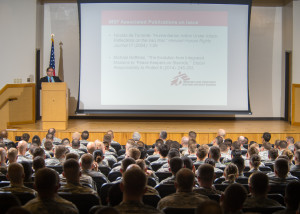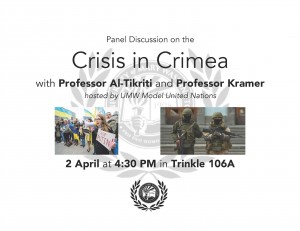 The Turkish History Foundation [TTK: Türk Tarih Kurumu], recently published the conference proceedings from the “International Piri Reis and Turkish Maritime History Symposium” [“Uluslararası Piri Reis ve Türk Denizcilik Tarihi Sempozyumu”], which Professor of History and American Studies Nabil Al-Tikriti participated in at Istanbul in September, 2013. The title of this peer-reviewed volume is Findings in Turkish Maritime History [Türk Deniz Tarihi Bildiriler]. Al-Tikriti‘s contribution is entitled “Advocating for Release: the al-Dārānī Appeals,” and can be downloaded from this link: https://www.academia.edu/10447817/Advocating_for_Release_the_al-D%C4%81r%C4%81n%C4%AB_Appeals.
The Turkish History Foundation [TTK: Türk Tarih Kurumu], recently published the conference proceedings from the “International Piri Reis and Turkish Maritime History Symposium” [“Uluslararası Piri Reis ve Türk Denizcilik Tarihi Sempozyumu”], which Professor of History and American Studies Nabil Al-Tikriti participated in at Istanbul in September, 2013. The title of this peer-reviewed volume is Findings in Turkish Maritime History [Türk Deniz Tarihi Bildiriler]. Al-Tikriti‘s contribution is entitled “Advocating for Release: the al-Dārānī Appeals,” and can be downloaded from this link: https://www.academia.edu/10447817/Advocating_for_Release_the_al-D%C4%81r%C4%81n%C4%AB_Appeals.Al-Tikriti Publishes Article on 16th Century Captives
 The Turkish History Foundation [TTK: Türk Tarih Kurumu], recently published the conference proceedings from the “International Piri Reis and Turkish Maritime History Symposium” [“Uluslararası Piri Reis ve Türk Denizcilik Tarihi Sempozyumu”], which Professor of History and American Studies Nabil Al-Tikriti participated in at Istanbul in September, 2013. The title of this peer-reviewed volume is Findings in Turkish Maritime History [Türk Deniz Tarihi Bildiriler]. Al-Tikriti‘s contribution is entitled “Advocating for Release: the al-Dārānī Appeals,” and can be downloaded from this link: https://www.academia.edu/10447817/Advocating_for_Release_the_al-D%C4%81r%C4%81n%C4%AB_Appeals.
The Turkish History Foundation [TTK: Türk Tarih Kurumu], recently published the conference proceedings from the “International Piri Reis and Turkish Maritime History Symposium” [“Uluslararası Piri Reis ve Türk Denizcilik Tarihi Sempozyumu”], which Professor of History and American Studies Nabil Al-Tikriti participated in at Istanbul in September, 2013. The title of this peer-reviewed volume is Findings in Turkish Maritime History [Türk Deniz Tarihi Bildiriler]. Al-Tikriti‘s contribution is entitled “Advocating for Release: the al-Dārānī Appeals,” and can be downloaded from this link: https://www.academia.edu/10447817/Advocating_for_Release_the_al-D%C4%81r%C4%81n%C4%AB_Appeals.


